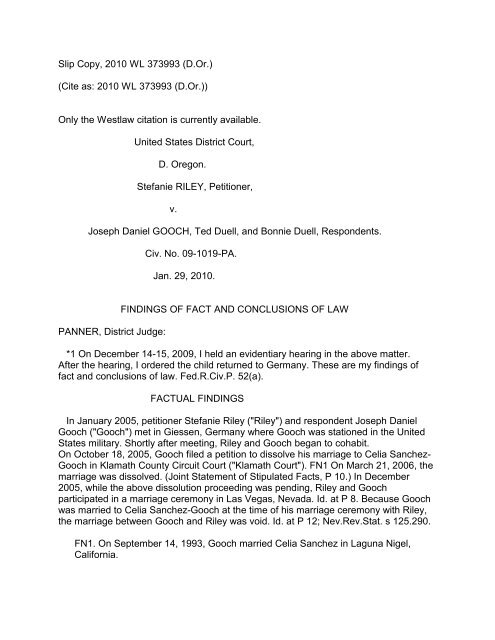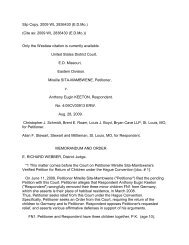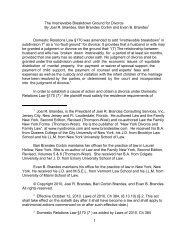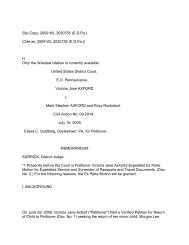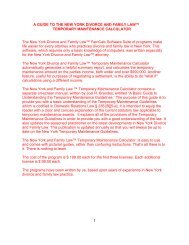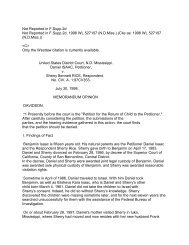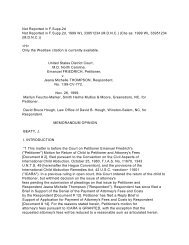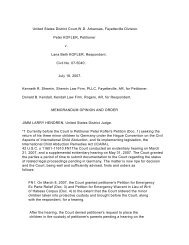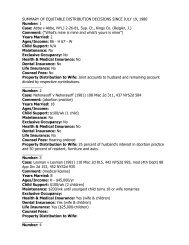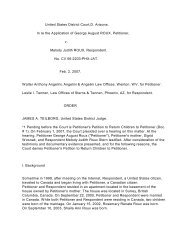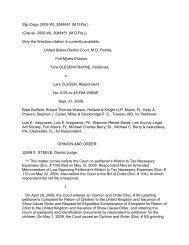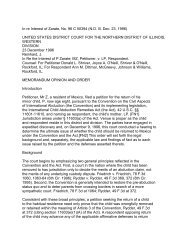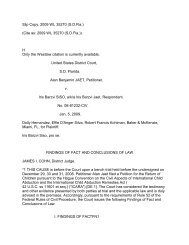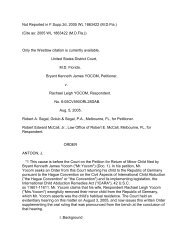Riley v. Gooch - Joel R. Brandes Consulting Services, Inc.
Riley v. Gooch - Joel R. Brandes Consulting Services, Inc.
Riley v. Gooch - Joel R. Brandes Consulting Services, Inc.
You also want an ePaper? Increase the reach of your titles
YUMPU automatically turns print PDFs into web optimized ePapers that Google loves.
Slip Copy, 2010 WL 373993 (D.Or.)<br />
(Cite as: 2010 WL 373993 (D.Or.))<br />
Only the Westlaw citation is currently available.<br />
United States District Court,<br />
D. Oregon.<br />
Stefanie RILEY, Petitioner,<br />
v.<br />
Joseph Daniel GOOCH, Ted Duell, and Bonnie Duell, Respondents.<br />
Civ. No. 09-1019-PA.<br />
Jan. 29, 2010.<br />
PANNER, District Judge:<br />
FINDINGS OF FACT AND CONCLUSIONS OF LAW<br />
*1 On December 14-15, 2009, I held an evidentiary hearing in the above matter.<br />
After the hearing, I ordered the child returned to Germany. These are my findings of<br />
fact and conclusions of law. Fed.R.Civ.P. 52(a).<br />
FACTUAL FINDINGS<br />
In January 2005, petitioner Stefanie <strong>Riley</strong> ("<strong>Riley</strong>") and respondent Joseph Daniel<br />
<strong>Gooch</strong> ("<strong>Gooch</strong>") met in Giessen, Germany where <strong>Gooch</strong> was stationed in the United<br />
States military. Shortly after meeting, <strong>Riley</strong> and <strong>Gooch</strong> began to cohabit.<br />
On October 18, 2005, <strong>Gooch</strong> filed a petition to dissolve his marriage to Celia Sanchez-<br />
<strong>Gooch</strong> in Klamath County Circuit Court ("Klamath Court"). FN1 On March 21, 2006, the<br />
marriage was dissolved. (Joint Statement of Stipulated Facts, P 10.) In December<br />
2005, while the above dissolution proceeding was pending, <strong>Riley</strong> and <strong>Gooch</strong><br />
participated in a marriage ceremony in Las Vegas, Nevada. Id. at P 8. Because <strong>Gooch</strong><br />
was married to Celia Sanchez-<strong>Gooch</strong> at the time of his marriage ceremony with <strong>Riley</strong>,<br />
the marriage between <strong>Gooch</strong> and <strong>Riley</strong> was void. Id. at P 12; Nev.Rev.Stat. s 125.290.<br />
FN1. On September 14, 1993, <strong>Gooch</strong> married Celia Sanchez in Laguna Nigel,<br />
California.
I reject <strong>Gooch</strong>'s testimony that he and <strong>Riley</strong> participated in a second wedding<br />
ceremony in Denmark. Other than his own testimony, <strong>Gooch</strong> offered no evidence<br />
supporting a second ceremony. To believe that <strong>Gooch</strong> and <strong>Riley</strong> participated in a<br />
second ceremony, specifically because they both knew the first marriage was invalid,<br />
yet failed to keep any documentation confirming the ceremony, strains the limits of<br />
belief. Additionally, in <strong>Gooch</strong>'s divorce proceeding against <strong>Riley</strong>, <strong>Gooch</strong> makes no<br />
mention of any marriage in Denmark, instead stating that he and <strong>Riley</strong> were legally<br />
married in Las Vegas in 2005. Similarly, on ZVG's Application for Consular Report of<br />
Birth Abroad, <strong>Gooch</strong> listed the 2005 Las Vegas marriage ceremony. Finally, I find<br />
credible <strong>Riley</strong>'s adamant testimony that they never participated in a second ceremony.<br />
<strong>Gooch</strong> and <strong>Riley</strong> returned to Germany and ZVG FN2-the child at issue in this casewas<br />
born on July 16, 2007 in Giessen, Germany. <strong>Riley</strong> has two sons, aged ten and<br />
seven, from previous relationships. Under the German Civil Code, Fifth title, Parental<br />
Custody s 1626a, <strong>Riley</strong> has "rights of custody" for ZVG. FN3 (Joint Statement of<br />
Stipulated facts, P 30.) On October 1, 2007, <strong>Riley</strong> and <strong>Gooch</strong> filed an application for a<br />
United States ("U.S.") passport for ZVG.<br />
FN2. Because ZVG is a minor, I use only her initials.<br />
FN3. Under this code, if the parents are not married upon the child's birth,<br />
the mother has sole custody unless the parents subsequently marry or declare<br />
they wish to exercise joint custody. Id.<br />
In December 2007, <strong>Gooch</strong> received an honorable discharge from the U.S. military.<br />
On December 14, 2007, <strong>Gooch</strong>, <strong>Riley</strong>, ZVG, and <strong>Riley</strong>'s two sons flew to the U.S. on<br />
one-way tickets provided by the U.S. government. The government also shipped the<br />
majority of the family's belongings to the United States. <strong>Riley</strong> left some belongings at<br />
her mother's home in Germany. Although the parties dispute the purpose of the trip, I<br />
find that <strong>Riley</strong> believed the purpose of the trip was to help care for <strong>Gooch</strong>'s<br />
grandparents. While <strong>Gooch</strong> may have intended to permanently settle in the U.S., I find<br />
that <strong>Riley</strong> intended to return to Germany with her three children 90 days after entering<br />
the U.S.<br />
*2 In making this finding, I note that <strong>Riley</strong> and her children entered the U.S.<br />
through the Visa Waiver Program ("VWP"). At the time of the trip, <strong>Riley</strong>, ZVG, and<br />
<strong>Riley</strong>'s sons only held German passports. As the name entails, the VWP allows foreign<br />
citizens to enter the U.S. without a visa. The VWP requires all participants exit the U.S.<br />
within 90 days of entrance.FN4 The VWP also requires each entrant possess a return<br />
airline ticket as a prerequisite to entering the U.S. Using his grandfather's credit card,<br />
<strong>Gooch</strong> purchased return tickets to Germany for <strong>Riley</strong> and the three children. Prior to<br />
December 2007, <strong>Riley</strong> had visited the U.S. on approximately five previous occasions.<br />
On each occasion, <strong>Riley</strong> returned to Germany within 90 days of entering the U.S.<br />
FN4. I note <strong>Riley</strong>'s precarious immigration status as it is "a highly<br />
relevant circumstance where, as here, the shared intent of the parties is in
dispute." Mozes, 239 F.3d 1067, 1082 (9th Cir.2001).<br />
The finding that <strong>Riley</strong> intended to return to Germany within 90 days is collaborated by<br />
the credible testimony of <strong>Riley</strong>'s witnesses. <strong>Riley</strong>, <strong>Riley</strong>'s sister Annette Meyer<br />
("Meyer"), <strong>Riley</strong>'s lifelong friend Jasmin Hoover ("Hoover"), and Justin Flanders<br />
("Flanders")-the American father of <strong>Riley</strong>'s oldest son-all testified convincingly that <strong>Riley</strong><br />
would never consider living anywhere other than Germany. Other than <strong>Gooch</strong>, no one<br />
testifying on behalf of the respondents could speak with personal knowledge as to<br />
<strong>Riley</strong>'s intent or actions prior to leaving Germany. Meyer and Hoover both testified that<br />
<strong>Riley</strong> stated, prior to leaving Germany in December 2007, that the purpose of the trip<br />
was to care for <strong>Gooch</strong>'s grandparents and that <strong>Riley</strong> stated she would return to<br />
Germany in 90 days.<br />
Additionally, although <strong>Riley</strong> filled out an application for a U.S. immigrant visa, she<br />
never signed or submitted the application. <strong>Riley</strong> kept her German bank account open,<br />
and never opened a U.S. bank account. <strong>Riley</strong> kept her sons enrolled in Kindergeld-a<br />
German equivalent of welfare-receiving a monthly check of approximately 300 dollars<br />
for each enrolled child.FN5 The payments ended when <strong>Riley</strong> did not return to Germany<br />
within 90 days. <strong>Riley</strong> never signed the children up for assistance in the U.S., although<br />
she did attempt, out of absolute necessity, to obtain food stamps in August 2008. That<br />
said, <strong>Riley</strong>'s older son attended a California school beginning in January, 2008. That<br />
son also attended school in Klamath Falls, Oregon from April 4 through May 27, and<br />
June 3 through 12, 2009.<br />
FN5. <strong>Riley</strong> never signed ZVG up for Kindergeld, even though ZVG was born in,<br />
and spent her first five months in Germany.<br />
Although <strong>Gooch</strong> testified that the family plan was to move permanently to the U.S.<br />
and that the family would deal with the 90-day VWP limits after arrival, I do not find his<br />
testimony credible considering the evidence above. In making this finding, I also<br />
considered the evidence supporting <strong>Gooch</strong>'s position, including evidence that: the<br />
family<br />
ended up staying for eight months; the family shipped most of their personal property to<br />
the U.S.; FN6 <strong>Riley</strong> and <strong>Gooch</strong> signed a one-year lease on a home in California; and<br />
<strong>Riley</strong> told the Duells and <strong>Gooch</strong>'s grandparents that she liked living in the U.S. and<br />
wanted to bring other family members to the U.S.<br />
FN6. Although the family did ship the majority of their belongings to the<br />
U.S., I note that the U.S. government provided a strong incentive for the<br />
family to do so. Holder, 392 F.3d 1009, 1018 (9th Cir.2004). Thus, while<br />
the shipment of personal property is not dispositive of the parents' intent,<br />
I did consider that evidence in my findings.<br />
*3 Upon arriving in the U.S., the family went to <strong>Gooch</strong>'s grandparents' home in Yucca<br />
Valley, California. Although <strong>Riley</strong> believed they would be providing temporary care for
<strong>Gooch</strong>'s grandparents, <strong>Gooch</strong> never relayed that information to his grandparents.<br />
<strong>Riley</strong>'s actions upon arriving in Yucca Valley support this finding. For example, <strong>Riley</strong><br />
told<br />
the caretaker her services were no longer needed, and attempted to cook and clean for<br />
the family and <strong>Gooch</strong>'s grandparents. In short, to the surprise of <strong>Gooch</strong>'s grandparents,<br />
<strong>Riley</strong> acted as though she was their caretaker. This caused some tension between<br />
<strong>Riley</strong><br />
and <strong>Gooch</strong>'s grandmother.<br />
<strong>Gooch</strong>'s grandparents did not have space for the family and on December 21, 2007,<br />
<strong>Riley</strong> and <strong>Gooch</strong> signed a one-year lease for a rental home in Yucca Valley.<br />
<strong>Riley</strong> and <strong>Gooch</strong> rented appliances and furniture from a rent-to-own company. <strong>Riley</strong><br />
and <strong>Gooch</strong> also purchased a puppy. Despite the above facts, <strong>Riley</strong>'s testimony that she<br />
never intended to live in the house for more than 90 days is credible. Quite simply, the<br />
family had nowhere else to go, and they needed to live somewhere. I also consider the<br />
fact that <strong>Riley</strong> was in a foreign country with no friends, little money, three children, and<br />
return tickets for a flight to Germany in approximately three months time. Indeed,<br />
Hoover testified that <strong>Riley</strong> called her and reported that from her first day in the U.S.,<br />
<strong>Riley</strong> was very unhappy and distressed with the entire situation. Further, <strong>Riley</strong> was, for<br />
the most part, economically dependent on <strong>Gooch</strong>. Finally, <strong>Riley</strong> testified that she had<br />
previously tried to end her relationship with <strong>Gooch</strong> and that <strong>Gooch</strong> did not react well. I<br />
find credible <strong>Riley</strong>'s testimony that she was somewhat afraid to say "no" to <strong>Gooch</strong>.FN7 I<br />
also find that perhaps out of politeness, <strong>Riley</strong> overstated her happiness at being in the<br />
U.S. to <strong>Gooch</strong>'s grandparents and to respondents Ted and Bonnie Duell (the "Duells").<br />
FN7. This finding refers solely to <strong>Riley</strong>'s subjective belief regarding<br />
giving <strong>Gooch</strong> bad news.<br />
On February 25, 2008, shortly before the 90-day VWP time limit expired, <strong>Gooch</strong><br />
consulted an immigration attorney regarding the procedures for obtaining U.S.<br />
passports for <strong>Riley</strong> and one of her sons. <strong>Gooch</strong> testified <strong>Riley</strong> accompanied him to the<br />
attorney. <strong>Riley</strong> testified she never inquired about, and certainly never visited, an<br />
immigration attorney. Other than <strong>Gooch</strong>'s testimony, there is no evidence suggesting<br />
<strong>Riley</strong> visited the immigration attorney. The immigration attorney has no recollection of<br />
whether or not <strong>Riley</strong> attended the consultation.<br />
More importantly, <strong>Gooch</strong> found the attorney and filled out all of the intake forms.<br />
Considering all of the above, and that I generally find <strong>Riley</strong> more credible than <strong>Gooch</strong>, I<br />
find <strong>Riley</strong> neither inquired about, nor attended the consultation.<br />
<strong>Riley</strong>, her sons, and ZVG could not leave the U.S. as planned because the return<br />
tickets were nowhere to be found. Although the evidence regarding what happened to<br />
the return plane tickets is unclear, I find <strong>Riley</strong>'s testimony credible that although she<br />
wanted to return to Germany with her children, she had no means of doing so. <strong>Riley</strong><br />
testified that she asked <strong>Gooch</strong> for the tickets but he refused to provide them. Hoover<br />
testified that <strong>Riley</strong> called her near this time and stated <strong>Gooch</strong> would not provide the
eturn tickets. <strong>Riley</strong> and <strong>Gooch</strong> both claim they never physically possessed the tickets.<br />
It is undisputed that <strong>Gooch</strong> purchased the tickets using his grandfather's credit card.<br />
<strong>Riley</strong> did not have the means to purchase tickets herself.<br />
*4 Neither <strong>Gooch</strong> nor <strong>Riley</strong> obtained employment in Yucca Valley. In March 2008,<br />
Bonnie Duell flew to Yucca Valley because her mother-<strong>Gooch</strong>'s grandmother-was ill.<br />
Once there, she saw and spoke to <strong>Gooch</strong> for the first time in years. Bonnie Duell told<br />
<strong>Gooch</strong> that his step-father, Ted Duell, might be able to help secure employment for<br />
<strong>Gooch</strong> in Klamath Falls, Oregon. <strong>Riley</strong> and <strong>Gooch</strong> had not discussed the possibility of<br />
moving to Oregon prior to a few days immediately preceding the move. In late March or<br />
early April 2008, the family moved into the Duell residence in Klamath Falls, Oregon.<br />
The family left some belongings in California and stored the rest in one section of the<br />
Duell garage. On April 8, 2008, <strong>Gooch</strong> began working for the same company the Duells<br />
worked for. <strong>Gooch</strong> listed the entire family on his enrollment forms for employee<br />
benefits, including health insurance.<br />
The relationship between <strong>Riley</strong> and the Duells was acrimonious. Among a variety of<br />
issues, the Duells claimed <strong>Riley</strong> drank too much beer while consuming pain medication.<br />
Their testimony was not persuasive. Although <strong>Riley</strong> drank and took pain medication<br />
prescribed by her doctors, the evidence does not suggest she abused alcohol or drugs.<br />
Further, <strong>Riley</strong> did not hide her use of pain medication. This was only one issue between<br />
<strong>Riley</strong> and the Duells. Generally, a lot of tension arose from the fact that <strong>Riley</strong> and the<br />
Duells simply did not care for each other.<br />
After approximately two months, the Duells asked the family to move out. In June<br />
2008, the family rented a home from a friend of the Duells. In exchange for one month<br />
of free rent, <strong>Riley</strong> and <strong>Gooch</strong> performed work on the home. Specifically, in addition to a<br />
substantial amount of cleaning, <strong>Riley</strong> chose the colors, and then painted the interior of<br />
the home. I find that the family had very little money and these improvements were<br />
motivated by a desire to save on rent. Bonnie Duell agreed to pay 25 percent of the<br />
monthly rent. While looking at the house, <strong>Gooch</strong>, and perhaps <strong>Riley</strong>, spoke in vague<br />
terms about possibly purchasing the home at a later date. In June, <strong>Gooch</strong>'s<br />
grandparents brought the personal property and furniture left in California to Klamath<br />
Falls.<br />
On July 16, 2008, ZVG spent her first birthday with the Duells. On July 27, Bonnie<br />
Duell requested, and <strong>Riley</strong> and <strong>Gooch</strong> agreed, that the children should temporarily stay<br />
with the Duells. This request was in response to a visit by Bonnie Duell to the family<br />
home. The children had no food and very little supervision. The understanding between<br />
all the parties was that while the children were at the Duell home, <strong>Riley</strong> and <strong>Gooch</strong><br />
would attempt to work out the problems in their relationship. After that point, all parties<br />
understood the Duells would return ZVG to <strong>Riley</strong> and <strong>Gooch</strong>. Although <strong>Gooch</strong> visited<br />
the children every day, <strong>Riley</strong> did not visit the children at the Duell residence.<br />
On August 3, 2008, while the children were with the Duells, police were called to an
altercation between <strong>Riley</strong> and <strong>Gooch</strong>. As a result of this incident, <strong>Gooch</strong> moved out of<br />
the family home. <strong>Riley</strong> called Meyer and informed her the Duells would not return ZVG.<br />
Meyer instructed <strong>Riley</strong> to contact the authorities. On August 5 or 6, <strong>Riley</strong> requested<br />
help from the authorities in securing ZVG's return. The authorities informed <strong>Riley</strong> that<br />
since ZVG was currently with <strong>Gooch</strong>, they were unable to order ZVG's return to <strong>Riley</strong>.<br />
This testimony is collaborated by Bonnie Duell's testimony that the authorities called her<br />
and informed her that <strong>Riley</strong> stated the Duells had kidnaped the children and demanded<br />
"her boys back." The authorities arranged for Bonnie Duell to drop <strong>Riley</strong>'s sons off at<br />
the sheriff's station, where they would be returned to <strong>Riley</strong>. ZVG remained with <strong>Gooch</strong><br />
and the Duells.<br />
*5 On August 7, 2008, <strong>Gooch</strong> filed an action for dissolution of marriage against <strong>Riley</strong><br />
in Klamath Court. Bonnie Duell paid for the divorce, and attended the initial consultation<br />
with <strong>Gooch</strong> and the attorney. <strong>Gooch</strong> filed for divorce even though he knew his marriage<br />
to <strong>Riley</strong> was not valid. In making this finding, I specifically find that <strong>Gooch</strong> intentionally<br />
lied to the Klamath Court when he stated, in his Petition for Dissolution of Marriage, that<br />
he and <strong>Riley</strong> "were duly and legally married at Las Vegas, Nevada, on December 20,<br />
2005. FN8 (Pet'r's Ex.<br />
9, 3.)<br />
FN8. 0n cross examination, <strong>Gooch</strong> admitted to not being completely honest<br />
with the Klamath Court.<br />
As a result of this filing, the court issued a temporary restraining order, preventing<br />
<strong>Riley</strong> from removing ZVG from either the Duell home or the state of Oregon. Id. at 12-<br />
18. Although <strong>Gooch</strong> testified that his motivation for filing for divorce was to protect his<br />
assets, I do not find his testimony credible. As stated above, <strong>Riley</strong> and <strong>Gooch</strong> both<br />
knew the 2005 Las Vegas marriage was not valid. I find <strong>Gooch</strong>'s motivation in filing for<br />
divorce was to obtain the temporary restraining order preventing <strong>Riley</strong> from removing<br />
ZVG from either the Duell residence or the state of Oregon. In short, I find that <strong>Gooch</strong><br />
wanted to begin the custody battle over ZVG in the United States, as opposed to<br />
Germany. Through a server of process, <strong>Gooch</strong> served <strong>Riley</strong> on August 14, 2008. Id. at<br />
19-20. <strong>Inc</strong>luded in the service was the temporary restraining order. Id . <strong>Riley</strong> never<br />
responded to the divorce proceedings. On October 3, 2008, Klamath Court entered a<br />
General Judgement of Dissolution, giving <strong>Gooch</strong> custody of ZVG.<br />
On August 8, 2009, the landlord gave <strong>Riley</strong> notice that rent was seven days past due.<br />
As stated above, <strong>Riley</strong> was not financially independent. The monthly Kindergeld<br />
payments ended when <strong>Riley</strong> did not return to Germany after 90 days.<br />
<strong>Riley</strong>'s only source of income was intermittent child support payments from Flanders<br />
averaging $250 per month. <strong>Riley</strong> had to ask neighbors for food for herself and her sons.<br />
Throughout her time in the U.S., <strong>Riley</strong> repeatedly asked friends and relatives for<br />
money, with little success.<br />
On, or shortly after August 8, <strong>Riley</strong> and her sons moved into the home of Chuck<br />
Poison ("Poison"). Near this time, <strong>Riley</strong> learned her mother's cancer had progressively
worsened. On August 12, ZVG began attending day care. I note that <strong>Gooch</strong> filled out<br />
the day care enrollment forms, and although <strong>Gooch</strong> and the Duells were authorized to<br />
pick ZVG up from day care, <strong>Riley</strong> was not authorized to do so.<br />
(Resp't's Ex. 124, 1.)<br />
I found Poison's testimony extremely credible. Poison stated <strong>Riley</strong> told him, at the<br />
time, that <strong>Gooch</strong> and the Duells were not allowing her to see ZVG. Poison said this<br />
distressed <strong>Riley</strong> greatly. Poison testified <strong>Riley</strong> did not want to return to Germany without<br />
ZVG, but that <strong>Riley</strong>'s position on leaving changed when her mother's condition<br />
worsened. Maria Clagett ("Clagett") also testified that <strong>Riley</strong> was very distressed, and<br />
that <strong>Riley</strong> stated she had to return to Germany but would return later for ZVG. On one<br />
occasion, Poison drove <strong>Riley</strong> to see ZVG but <strong>Gooch</strong> did not let <strong>Riley</strong> see ZVG. Poison<br />
advised <strong>Riley</strong> to return to Germany to get closure with her mother. After that, Poison<br />
told <strong>Riley</strong> she could come back and get ZVG.<br />
*6 Eventually, Poison bought <strong>Riley</strong> plane tickets to Germany for herself and her sons.<br />
As stated above, <strong>Riley</strong> did not have the means to purchase the tickets herself. On<br />
August 27, 2008, <strong>Riley</strong> returned to Germany with her two sons while ZVG stayed with<br />
<strong>Gooch</strong> and the Duells. <strong>Riley</strong>'s mother passed away six days later.<br />
Although <strong>Riley</strong> had contact information for <strong>Gooch</strong> and the Duells, she did not contact<br />
them for nearly three months. On November 21, 2008, <strong>Riley</strong> sent an email to Bonnie<br />
Duell, inquiring about ZVG. After receiving a brief update on ZVG, <strong>Riley</strong> wrote, "I am<br />
glad to hear that [ZVG] is doing fine. I truly miss her with all of my heart. It hurts alot<br />
[sic] to think about the fact that I[sic] will never see her again." Bonnie Duell responded:<br />
Well, never is a very long time. [ ] Just remember, Ted and I will do whatever it takes<br />
to protect [ZVG] from any harm ever. Ted and I will always try and make sure she has<br />
the very best of everything we can possible give her. [ ... ] Please, just always<br />
remember, she is in a very safe and happy home with us. Our whole lives have been<br />
put on hold in order to care for [ZVG....] I am so proud of you, that you had the<br />
courage to do the right thing for the baby. How are the boys dealing with not having<br />
her there with you. I hope they understand that it was something you had to do. [ ]<br />
(Pet'r's Ex. 21, p 1)<br />
<strong>Riley</strong> responded by writing:<br />
Of course, the boys talk about [ZVG] everyday, they do not understand the whole<br />
thing, but that is ok, they dont need to worry. i am sure that when [ZVG] gets to a<br />
certain age that i will talk to her. and her brothers will talk to her as well. but for the<br />
moment there is nothing i want to do that could rip her out of her home right now.<br />
Id. (unless noted, original spelling and punctuation).<br />
<strong>Riley</strong> testified that she took a friendly tone in the above emails because she did not
want to anger Bonnie Duell, as ZVG was living with <strong>Gooch</strong> and the Duells.<br />
Additionally, <strong>Riley</strong> was going through a very difficult period-economically and<br />
emotionally-and was evaluating her options on securing ZVG's return. Considering the<br />
circumstances, I find <strong>Riley</strong>'s testimony credible.<br />
Despite what <strong>Riley</strong> told Bonnie Duell, <strong>Riley</strong> was exploring her legal options to secure<br />
ZVG's return. In January 2009, <strong>Riley</strong> was appointed a German legal aid lawyer. On<br />
January 27, 2009, <strong>Riley</strong>'s attorney sent a letter to <strong>Gooch</strong> and the Duells, written in<br />
German, demanding ZVG's return. (Resp't's Ex. 144, 1.) While that attorney initiated<br />
custody proceedings in a German court, he did not file a petition under the Convention.<br />
On April 29, 2009, the Duells petitioned for guardianship over ZVG in Klamath Court.<br />
Although never served, <strong>Riley</strong> did have notice of the guardianship proceedings as<br />
evidenced by the chain of emails between <strong>Riley</strong> and Bonnie Duell on April 1 and 2,<br />
2009. The emails also demonstrate the change in <strong>Riley</strong>'s tone upon securing legal<br />
representation. Bonnie Duell wrote, "I have a huge favor to ask of you. Ted and I would<br />
like to get legal guardianship of [ZVG]. In order to do this, you would need to sign legal<br />
authorization." Id. at 4. <strong>Riley</strong> responded by writing:<br />
*7 A couple days ago Joe wrote me an Email telling me that it is HIS daughter and<br />
that he has custody of her. So my question is, what do you want from me now?<br />
Nobody asked me to sign anything, you people just stole her. And now you want my<br />
signature? I think it worked out very well for you guys, without my signature.<br />
Why don't you ask your little sunshine Joe for the signature, since he has custody? ?<br />
You know it is all bad enough how it is with my baby girl, but one day the truth will<br />
come out, no matter how many lies you guys spread about me.<br />
Id. (unless noted, original spelling and punctuation).<br />
Bonnie Duell responded:<br />
I am sorry, [<strong>Gooch</strong>] is still very angry and bitter toward you. But, that is between you<br />
and him.. True enough, [ZVG] is Joe's daughter, but alto true enough, [ZVG] is your<br />
daughter as well. Also, true, Joe does have full custody of her, by default, because you<br />
did not contest the divorce. I am so sorry that you feel we stole [ZVG] from you.. I<br />
have to disagree, but that is neither here nor there.. [..] What I would like from you,<br />
because she is living with me and Ted [ ... ] is to sign guardianship papers for us [so<br />
we can get medical and dental care for ZVG....] It is not like an adoption, [ ... ] it is only<br />
so we can keep Joe from removing her from our home when he gets mad at me. [ ... ]<br />
He has moved out from our house, but we still have [ZVG].. We are only trying to do<br />
what we think is best for now for [ZVG....] It isn't necessarily forever, ... it is just for<br />
now. I dont' think I have ever spread any lies about you Stefanie, what happened was<br />
between you and Joe and I am so sorry that all of it happened.<br />
[ ... ] I know you love [ZVG], and it was very difficult for you to leave her, but we both<br />
know that at the time it was the best thing to do, and i will always admire you for having<br />
the inner strength to do that.
Id. at 3 (unless noted, original spelling and punctuation).<br />
<strong>Riley</strong> responded by writing:<br />
didn't contest what? a divorce? Do not forget Bonnie, that I was never married to him.<br />
He was still married at the time we went to Vegas. He didn't tell you that? ... Well well,<br />
if you really insist of getting an address you can send those papers to, what about an<br />
address of one of my lawyers?<br />
Id. (unless noted, original spelling and punctuation).<br />
In mid 2009, <strong>Riley</strong> obtained a new German attorney. Eventually, <strong>Riley</strong> was referred to<br />
an Oregon attorney, who filed <strong>Riley</strong>'s Hague petition on August 27, 2009. <strong>Riley</strong> testified<br />
that she first learned of the Convention in August 2009. As of the date of the<br />
evidentiary hearing, the Duells were ZVG's residential custodians and primary<br />
caregivers. ZVG resided with the Duells from July 27, 2008 through December 15,<br />
2009. <strong>Gooch</strong> lived with the Duells and ZVG from approximately August 3, 2008 through<br />
March 2009. After moving out, <strong>Gooch</strong> maintained his relationship with ZVG. The Duells<br />
provided all of ZVG's day-to-day needs except during the hours ZVG spent in a licensed<br />
child care facility.<br />
CONCLUSIONS OF LAW<br />
*8 Adopted on October 25, 1980, the Hague Convention on the Civil Aspects of<br />
International Child Abduction, 19 I.L.M. 1501 (the "Convention") is an international<br />
treaty establishing procedures for "the prompt return of children wrongfully removed or<br />
retained in any Contracting State." Convention, Art. 1(a),<br />
19 I.L.M. at 1501. Congress enacted the International Child Abduction Remedies Act,<br />
24 U.S.C. ss 11601-11610 to implement the Convention. s 11601(b). Germany and the<br />
United States are both signatories to the Convention. Holder, 392 F.3d at 1013.<br />
The Convention aims to discourage forum shopping in international custody disputes.<br />
Id. The role of the court applying the Convention is solely to determine the rights<br />
available under the Convention, as opposed to the merits of the underlying child<br />
custody claim. Id. at 1013-14; s 11601(b)(4). In other words, the court does not<br />
"determine whether a child is happy where it currently is, but whether one parent is<br />
seeking unilaterally to alter the status quo with regard to the primary locus of the child's<br />
life." Mozes, 239 F.3d at 1079.<br />
I. Wrongful Removal or Retention<br />
The Convention only requires the return of a child whose removal or retention was<br />
"wrongful":<br />
The removal or the retention is to be considered wrongful where-
a) it is in breach of rights of custody attributed to a person ... under the law of the<br />
state in which the child was habitually resident immediately before the removal or<br />
retention; and<br />
b) at the time of removal or retention those rights were actually exercised, ...<br />
or would have been so exercised but for the removal or retention.<br />
Convention, Art. 3, 19 I.L.M. at 1501.<br />
In determining whether the removal or retention was "wrongful" under the Convention,<br />
courts answer four questions: (1) when did the removal or retention take place? (2)<br />
Immediately prior to the removal or retention, in which state was the child habitually<br />
resident? (3) Did the removal or retention breach the custody rights of the petitioner<br />
under the laws of the child's habitual residence? (4) was the petitioner exercising those<br />
rights at the time of the removal or retention?<br />
Mozes, 239 F.3d at 1070. The petitioner must establish that the removal or retention<br />
was "wrongful" by a preponderance of the evidence. s 11603(e)(1)(A).<br />
A. Date of Retention<br />
When one parent consents to the child staying with another, and that other person<br />
later refuses to return the child, the date of retention is that point when the noncustodial<br />
parent knows the custodial parent will not return the child. See Zuker v. Andrews, 2<br />
F.Supp.2d. 134, 139 (D.Ma.1998)(retention occurred when custodial parent clearly<br />
communicated her intention of not returning the child to the noncustodial parent); see<br />
also Mozes, 239 F.3d at 1070-71 (date of retention clearly the date the mother initiated<br />
custody proceedings, even though this date was prior to the end of the agreed-upon<br />
stay abroad); see also Slagenweit v.<br />
Slagenweit, 841 F.Supp. 264, 268 (N.D. IA 1993)(date of retention was date custodial<br />
parent filed for divorce because on that date it was clear to all that the custodial parent<br />
did not intend to return the child to the noncustodial parent); see also Schroeder v.<br />
Vigil-Escalera Perez, 76 Ohio Misc.2d, 25, 33-34,<br />
664 N.E.2d 627, 632 (1995)(citing Slagenweit in holding date of retention is date<br />
custody becomes an issue).<br />
*9 Thus, the date of retention is August 14, 2008, the date <strong>Gooch</strong> served <strong>Riley</strong> with<br />
the petition for dissolution of marriage. On that date, due to the temporary restraining<br />
order, <strong>Riley</strong> clearly knew respondents would not return ZVG.<br />
B. Immediately Prior to the Retention, In Which State Was ZVG Habitually Resident?<br />
<strong>Riley</strong> must establish, as a threshold matter, that as of August 14, 2008, ZVG's<br />
habitual residence was Germany. Holder, 392 F.3d at 1014-15. Otherwise, the<br />
Convention does not apply as ZVG is not retained in a state other than her state of<br />
habitual residence. Id.; see also Elisa Perez-Vera, Explanatory Report P 58, in<br />
3 Hague Conference on Private International Law, Acts and Documents of the
Fourteenth Session, Child Abduction 426 (1982) ("Perez Vera Report").FN9<br />
FN9. The Perez-Vera Report is widely known as "the official history and<br />
commentary on the Convention and is a source of background on the meaning of<br />
the provisions of the Convention ..." Mozes, 239 F.3d at 1070 (internal<br />
citations omitted). The full text of the Perez-Vera Report is available<br />
online at http://www.hcch.net/index_en.php? act=publications.details &<br />
pid=2779.<br />
Because "children ... normally lack the material and psychological wherewithal to<br />
decide where they will reside [,]" courts look to the intentions of those entitled to fix the<br />
child's residence when determining the habitual residence of a child. Mozes, 239 F.3d<br />
at 1076. A young child may acquire a new habitual residence in one of two ways: (1)<br />
through the parents' shared settled intention to abandon the initial habitual residence;<br />
or<br />
(2) if "the objective facts point unequivocally to a person's ordinary or habitual residence<br />
being in a particular place." Mozes, 239 F.3d at 1081 (internal citations omitted).<br />
Prior to December 14, 2007, ZVG's habitual residence was clearly Germany. As<br />
described in my Findings of Fact above, <strong>Riley</strong> intended to return with ZVG to Germany<br />
90 days after leaving. Thus, <strong>Riley</strong> and <strong>Gooch</strong> did not have the shared parental intent to<br />
abandon Germany as ZVG's habitual residence.<br />
Additionally, the facts here do not demonstrate acclimatization sufficient to overcome<br />
the lack of shared parental intent. In Holder, the court concluded that a five-year-old<br />
child who "attended kindergarten, participated in sports programs, and accompanied his<br />
parents on various excursions" over eight months had not developed "deep rooted ties"<br />
to Germany. Holder, 392 F.3d at 1020-21. Younger children have an even more<br />
difficult time acclimatizing. See Holder, 392 F.3d at<br />
1021-22 (recognizing that absent a shared parental intent to abandon the child's<br />
established habitual residence, "it is practically impossible for a newborn child, who is<br />
entirely dependent on its parents, to acclimatize independent of the immediate home<br />
environment of the parents.").<br />
Like the children in Holder, ZVG was in the United States for exactly eight months<br />
prior to the wrongful retention. However, ZVG lacked the stability of the Holder children.<br />
During the eight months, ZVG moved on five separate occasions. At less than 13-<br />
months-old, ZVG clearly could not develop the deep-rooted ties to the United States<br />
necessary to overcome her parents' lack of shared intent to abandon Germany. Thus,<br />
Germany remained ZVG's habitual residence as of August 14, 2008.<br />
C. Did the Removal or Retention Breach the Custody Rights of the Petitioner Under the<br />
Laws of the Child's Habitual Residence?<br />
*10 The parties stipulated that <strong>Riley</strong> had rights of custody under German law.<br />
(Joint Statement of Stipulated Facts, P 30.) Under the Convention, "rights of custody"
specifically include "the right to determine the child's place of residence." Convention,<br />
Art. 5(a), 19 I.L.M. at 1501. When <strong>Gooch</strong> served <strong>Riley</strong> with the temporary restraining<br />
order, he breached <strong>Riley</strong>'s custody rights.<br />
D. Was the Petitioner Exercising Those Rights At the Time of the Removal or<br />
Retention?<br />
If a petitioner has valid custody rights under the laws of the child's habitual residence,<br />
he or she will exercise those rights with nearly any act "short of acts that constitute<br />
clear and unequivocal abandonment of the child." Asvesta v.<br />
Petroutsas, 580 F.3d 1000, 1018 (9th Cir.2009) (internal citation omitted). Under the<br />
Convention, and in accordance with common sense, a parent who voluntarily sends a<br />
child to live with another has not relinquished custody rights. Baxter v.<br />
Baxter, 423 F.3d 363, 371 (3rd Cir.2005); 51 Fed.Reg. at 10506.<br />
As stated above in my Findings of Fact, <strong>Riley</strong>, <strong>Gooch</strong>, and the Duells intended ZVG's<br />
stay with the Duells to be temporary. Thus, <strong>Riley</strong> was exercising her custody rights at<br />
the time of retention.<br />
II. Affirmative Defenses<br />
If the petitioner establishes the wrongful removal or retention of a child, the child must<br />
be promptly returned to the country of habitual residence unless the respondent<br />
establishes an affirmative defense. Convention, Art. 12, 13; s 11603(e)(2). As<br />
described above, <strong>Riley</strong> established a prima facie case that ZVG was wrongfully retained<br />
in the United States.<br />
A. The Now Settled Defense<br />
The court is not required to order the return of the child if the petition for return was<br />
filed more than one-year from the date of wrongful removal or retention and the<br />
respondent demonstrates that the child is now settled in the new environment.<br />
Convention, Art. 12; In re B. Del C.S.B., 559 F.3d 999, 1002-3 (9th Cir.2009). The<br />
respondent must prove the child is now settled by a preponderance of the evidence. s<br />
11603(e)(2)(B).<br />
Similar to the habitual residence analysis, the court inquires as to "the child's relative<br />
attachments" to the new country and then determines if those attachments are so<br />
significant as to require keeping the child in the new country.<br />
In re B. Del C.S.B., 559 F.3d at 1011 (quoting Mozes, 239 F.3d at 1081).<br />
Respondents must demonstrate "nothing less than substantial evidence of the child's<br />
significant connections to the new country [.]" In re B. Del C.S.B., 559 F.3d at 1003<br />
(quoting Public Notice 957, Hague International Child Abduction Convention; Text and<br />
Legal Analysis, 51 Fed.Reg. 10494, 10509 (U.S. Dep't of State, March 26, 1986).<br />
In determining whether a child has "significant connections to the new country," the
court considers a number of factors including: (1) the child's age;<br />
(2) the stability and duration of the child's residence in the new environment;<br />
(3) whether the child attends school or day care consistently; (4) whether the child has<br />
friends and relatives in the new area; (5) the child's participation in community or<br />
extracurricular activities; and (6) the respondent's employment and financial stability. In<br />
re B. Del C.S.B., 559 F.3d at 1009. The child's stability and duration in the new<br />
environment is generally the most important factor. Id.<br />
*11 Although ZVG appears to be a very happy two-year-old, the fact remains that she<br />
is only two years old. According to Ted Duell's testimony, as of the hearing date, ZVG<br />
could almost make it through the ABCs. Respondents did not cite, and I could not find,<br />
a case in which a court refused to order the return of a two-year-old child because the<br />
child was now settled in her new environment.<br />
Respondents cite Wojcik v. Wojcik, 959 F.Supp. 413 (E.D.Mi.1997) in support of their<br />
article 12 defense. However, Wojcik involved two children, aged five and eight. Id. at<br />
421. Indeed, the court in Wojcik specifically compared the result reached there with<br />
another case, involving a three-year-old and a one-year-old, in which that court<br />
suggested very young children have trouble developing significant ties to the community<br />
and developing meaningful friendships. See Id. (comparing David S. v. Zamira S., 151<br />
Misc.2d 630, 574 N.Y.S.2d 429, 433 (N.Y.Fam.Ct.1991)).<br />
Since Zamira, other courts have noted difficulties in determining whether very young<br />
children are settled. In Moreno v. Martin, 2008 WL 4716958 at *21 (S.D.Fl.) , the court<br />
concluded, a fortiori, "that a three-year-old child who has moved five times in just one<br />
and a half years is not well settled." (emphasis in original).<br />
Although that child attended day care, the court noted that "it is questionable whether a<br />
[ three-year-old child] has the developmental capacity to engage meaningfully in<br />
[regular social, community, or extracurricular activities] and be considered settled due<br />
to them." Id.<br />
Another court concluded a nine-year-old who completed three years in the same<br />
school and had many friends both in and out of school, was "now old enough to<br />
experience meaningful ties with the United States." Belay v. Getachew, 272 F.Supp.2d<br />
553, 562 (D.Md.2003). Another court noted that while an eleven-year-old and a sixyear-old<br />
were old enough to "allow meaningful connections to the new environment to<br />
evolve ....children of a very young age are not." In re Robinson,<br />
983 F.Supp. 1339, 1345-46 (D.Co.1997)(citing Zamira, 151 Misc.2d at 636, 574<br />
N.Y.S.2d at 433). In In re Robinson, the children lived in the same area for 22 months,<br />
had active involvement with respondent's extended family, were doing well in school,<br />
had made friends in and out of school, and were "active participants in extracurricular<br />
activities such as Cub Scouts, Kampus Club, hockey and soccer."<br />
983 F.Supp. at 1346.<br />
In Zuker, the court concluded the child, four years and two months old when the<br />
petition was filed, was now settled. 2 F.Supp.2d at 141. That child had lived in<br />
the United States for 15 months prior to the filing of the petition. Id. at 140.
However, the respondent in Zuker submitted much more evidence than respondents<br />
here in demonstrating that the child was now settled. Significantly, the Zuker court<br />
noted an affidavit from the Executive Director of the child's day care center, stating the<br />
child "has grown and thrived academically and socially,"<br />
"attends birthday parties and playdates at his home and at the homes of his friends [,]"<br />
and had "established relationships with teachers, children and other staff." Id. at 141.<br />
This sort of evidence, crucial in a case with such a young child, was entirely lacking<br />
here .FN10 More importantly, ZVG was only half the age of the child in Zuker at the<br />
filing of the respective petitions.<br />
FN10. I must note that the parties did not conduct much briefing or<br />
discovery on the well-settled issue. This is in large part due to the fact<br />
that respondents did not assert this affirmative defense until three days<br />
prior to the hearing.<br />
*12 As stated above in my Findings of Fact, ZVG attended day care consistently<br />
since August 2008. Respondents testified ZVG enjoys day care and has some friends.<br />
ZVG lived with the Duells, in the same residence since July 2008. ZVG enjoys going on<br />
neighborhood walks with the Duells. ZVG speaks English, but not German.<br />
However, during her two years in the United States, ZVG has moved on five separate<br />
occasions. She has not seen her mother or her half-brothers in 16 months.<br />
Although <strong>Gooch</strong> has a close relationship with ZVG, he moved out of the Duell home in<br />
March 2009. As one would expect of a two-year old, ZVG does not partake in any<br />
community or extracurricular activities, clubs, or sports.<br />
I conclude that <strong>Gooch</strong> and the Duells failed to establish that ZVG had developed such<br />
significant connections to the United States that ordering her return to Germany would<br />
be disruptive, with likely harmful effects. Rather, I conclude respondents demonstrated<br />
that ZVG is, like most two-year-olds, very adaptable.<br />
B. Consent and Acquiescence<br />
The court is not required to order the return of the child if the respondent establishes,<br />
by a preponderance of the evidence, that the petitioner either consented to the removal<br />
or retention, or subsequently acquiesced to the prior interference with her custody<br />
rights. Convention, Art. 13(a), 19 I.L.M. at 1502; s 11603(e)(2)(B). Obviously, one may<br />
consent to a limited visit without relinquishing the future right to demand the child's<br />
return. Wanninger v.<br />
Wanninqer, 850 F.Supp. 78, 82 (D.Mass.1994); Baxter v. Baxter, 423 F.3d 363,<br />
371-72 (3rd Cir.2005). Thus, the scope, terms, and conditions of an agreed upon visit<br />
are relevant to the consent inquiry. Baxter, 423 F.3d at 371-72.<br />
As stated above in my Findings of Fact, all of the parties involved believed the Duells<br />
would watch the children for a short time only, after which the children would be<br />
returned to <strong>Riley</strong> and <strong>Gooch</strong>. Additionally, as stated above in my Findings of Fact,
Meyer, Polson, and Clagett testified <strong>Riley</strong>'s actions at the time were not consistent with<br />
the actions of one who had consented.<br />
To demonstrate petitioner's subsequent acquiescence, the respondent must<br />
demonstrate "an act or statement with the requisite formality, such as testimony in a<br />
judicial proceeding; a convincing written renunciation of rights; or a consistent attitude<br />
of acquiescence over a significant period of time." Baxter,<br />
423 F.3d at 371. This defense requires an inquiry into the petitioner's subjective intent.<br />
Id.<br />
The Duells point to the email exchange between <strong>Riley</strong> and Bonnie Duell on November<br />
21, 2008 as objective evidence demonstrating <strong>Riley</strong>'s acquiescence.<br />
(Trial Brief for Resp'ts Ted nd Bonnie Duell, 20.) As I stated in my Findings of Fact<br />
above, I found credible <strong>Riley</strong>'s testimony concerning her subjective intent in the emails.<br />
Considering that intent, the circumstances involved in the retention, <strong>Riley</strong>'s relationship<br />
with Bonnie Duell, and the fact that <strong>Riley</strong> was still looking for legal assistance to secure<br />
ZVG's return, the emails are not evidence of acquiescence. For similar reasons, I<br />
conclude that <strong>Riley</strong>'s silence for nearly three months after the wrongful retention is<br />
understandable.<br />
*13 <strong>Gooch</strong> and the Duells testified that prior to leaving the U.S., <strong>Riley</strong> never<br />
specifically requested that they return ZVG. However, after being rebuffed by the local<br />
authorities and subsequently served with a restraining order issued by the state of<br />
Oregon, <strong>Riley</strong> had no further reason to request ZVG's return from <strong>Gooch</strong> or the Duells<br />
directly. <strong>Riley</strong>'s relationship with the Duells, always acrimonious, had completely<br />
deteriorated. For example, although by this time <strong>Riley</strong> knew the Duells would not return<br />
ZVG, she asked Bonnie Duell to purchase plane tickets to Germany for herself and her<br />
sons. Bonnie Duell refused, stating that she could not afford to pay for the divorce and<br />
the plane tickets. Further, <strong>Riley</strong> was in the country illegally and was worried about the<br />
state taking her sons. Considering the circumstances, I do not consider the above<br />
evidence of acquiescence.<br />
I also considered the testimony of Polson, Meyer, Hoover, and Flanders. Their<br />
testimony demonstrates that rather than acquiescing to ZVG staying with <strong>Gooch</strong> and<br />
the Duells, <strong>Riley</strong> was distressed with the situation and actively attempted to secure<br />
ZVG's return. Additionally, the fact that <strong>Riley</strong> obtained an attorney in January 2009 to<br />
secure ZVG's return is compelling evidence that <strong>Riley</strong> did not<br />
acquiesce.FN11 Finally, as shown in my Findings of Fact above, <strong>Riley</strong>'s tone in her<br />
emails with Bonnie Duell changed dramatically after <strong>Riley</strong> secured an attorney.<br />
Thus, although <strong>Riley</strong> did not file the petition for return until one year and 13 days after<br />
the wrongful retention, I conclude that <strong>Riley</strong> clearly did not exhibit a "consistent attitude<br />
of acquiescence over a significant period of time."<br />
FN11. As noted above, that attorney failed to advise <strong>Riley</strong> of the<br />
Convention.
C. Grave Risk of Physical or Psychological Harm<br />
A court shall not order the return of a child if respondent establishes, by clear and<br />
convincing evidence, that there is a grave risk of physical or psychological harm if the<br />
child is returned. Convention, Art. 13(b), 19 I.L.M. at 1502. A serious risk of harm is not<br />
enough to prevent the prompt return of a wrongfully removed or retained child; the risk<br />
must be grave. See Gaudin v.<br />
Remis, 415 F.3d 1028, 1036-37 (9th. Cir.2005)(quoting 51 Fed.Reg. at 10509).<br />
Although the living situation prior to removal may be relevant, the focus is on the<br />
situation into which the child would be returned. Baxter, 423 F.3d at 374.<br />
To the extent respondents attempted to establish this affirmative defense, they failed<br />
to meet the stringent burden that returning ZVG to <strong>Riley</strong> presents a grave risk of<br />
immediate harm to ZVG. Although respondents presented evidence that <strong>Riley</strong> abused<br />
alcohol and prescription pain medication approximately 16 months ago, I do not find<br />
that to be true.<br />
CONCLUSION<br />
<strong>Riley</strong> established, by a preponderance of the evidence, that ZVG was "wrongfully<br />
retained" in the United States. Neither <strong>Gooch</strong> nor the Duells established an affirmative<br />
defense. Thus, under the Convention, I ordered ZVG's prompt return to Germany, her<br />
country of habitual residence.<br />
D.Or.,2010.<br />
<strong>Riley</strong> v. <strong>Gooch</strong><br />
Slip Copy, 2010 WL 373993 (D.Or.)<br />
END OF DOCUMENT


